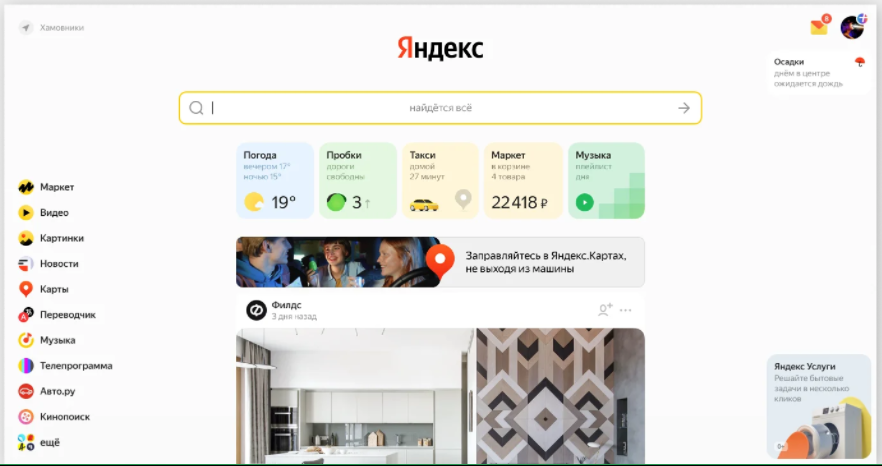Yandex has majorly updated its search engine, with more than 2,100 improvements to both the algorithm and search interface being touted.
New features include meaningful video snippet search, smart camera, and caller ID upgrades to combat spam, more diverse “quick replies” (infer Google autocomplete/instant answers), and a beta version of an improved design.
Yandex made the announcement via their official blog.
In this article, we’ll be giving an overview of the new algorithm, as well as some of the new search features – including a redesigned home page.
New (and improved) features include:
- Search for, and skip to relevant fragments within videos
- Quick replies
When a person enters a query into a search engine, they are looking for information or a way to solve their problem. Our global goal is to help find such answers, and immediately in the most comprehensive way, in order to save people time. This trend towards speeding up the solution of user tasks has been especially noticeable in recent years. For example, now many users ask their questions not by text in the search, but by the voice assistant.
Search “Without Search”
The Y1 post has also introduced the wording/concept of Поиск без поиска (Search, without search), which we know in the Western SEO world as Zero Click Search.
In the Y1 update, Yandex have shown examples of a number of sectors and topics this will affect – including:
- Flights
- Hotels
- Weather
- Tourist Attractions
- TV/Movies/Entertainment
- Sporting & Cultural events
I will be following up this article with a more in-depth look at how this feature has developed, and possible implications for various verticals – and how they can turn this threat into an opportunity.
Quick Replies
A person who is looking for something often needs a specific answer. Almost always, this answer is on the pages in the search results – but it still needs to be found. It would be great to ask, for example, [how to connect the Metrica counter?] And immediately get step-by-step instructions.
This is exactly what Y1 does. If the page contains a response that responds well and accurately to the request, Yandex can select it for a “quick response”. This response is shown first on the results page: above the rest of the organic search results and sponsored links.
There were ready-made answers in the search before: Yandex has long been able to say [how much an elephant weighs] or [what is the height of Fujiyama] . There are many more such answers in Y1. Also, completely new categories of quick answers have appeared in the search: not only about facts, but also for broad information requests.
Now Yandex will immediately tell you [why the water in the aquarium becomes cloudy] , [hidden iOS features] or [how to find the same title and description] .
Optimizing For Quick Replies
Hitting a quick response can drive more conversions and increase website awareness. There is no simple answer on how to do this: algorithms select content for a quick response based on many factors. To increase your chances of being hit:
- The site must be of high quality
- He must respond well to a specific request: accurately, truthfully, and without embellishment
- Increased emphasis on business reviews within the SERP interface
New Main Page Interface
As part of the update, Yandex has unveiled a new main page design, modernizing the current portal interface.


You can access the new main page interface, which is still in beta, via this link: https://yandex.ru/beta?utm_source=landing&um_medium=block&utm_campaign=y1
Searching For Relevant Fragments Within Videos
Many “how to” queries are much easier and practical to show via video, than to describe in text. Now the search itself starts the video from the moment where the answer to the question begins. To do this, it matches the request with both the video itself and the audio track.
Optimizing Your Videos For This Feature
- Post more high-quality DIY videos: it can drive additional search traffic.
- Make sure that the video contains clear and useful instructions.
- Submit video data to search using markup and add a link to the video stream in the markup. You can find more in the animated previews help section.
Organization Review Scores
When choosing organizations – especially cafes and restaurants – people are often guided by reviews. Sometimes there are a lot of these reviews: hundreds and even thousands. To help people make decisions faster, Yandex’s algorithms now analyze reviews themselves and show a summary rating.
For a query about a cafe or restaurant, the search will show how visitors rate it according to various parameters: for example, whether they liked the cuisine, staff, or music.
Optimizing For The New Reviews Feature
- Encourage visitors to leave reviews: they are very important when choosing a cafe or restaurant.
- Analyze feedback and work on improvements.
Machine Learning Making Y1 Possible
The Y1 improvements are made possible by two new technologies: YaTI and YaLM. They are based on heavy neural networks with a “transformer” architecture, which are trained on billions of parameters.
Huge generative neural networks came to our aid, which are capable of processing, summarizing and presenting texts in a capacious form in natural language. Perhaps the most unexpected feature of such networks was the ability to quickly learn new tasks without having to collect large datasets.
YATI
A transforming neural network with an attention mechanism solves the main search problem – evaluates the semantic connection between the request and the page. YaTI is about a million times more complex than previous search models. It allows the search to better understand the meaning of the text: for example, to distinguish the context of each word or to take into account the necessary fragment when searching, rather than the entire page.
YATI was introduced at YaC 2020. You can read our guide to YATI here.
YALM
YALM is a family of generative neural networks that write texts in Russian themselves are sometimes no worse than humans. YaLM models are trained on several terabytes of text: in fact, on the entire Russian Internet.
This technology helps not only to show the user the text of the most relevant page, but can formulate the answer itself, which is not yet on the web.
You can read about how Yandex has applied generative neural networks to it’s search product in this Habr article.







